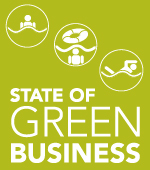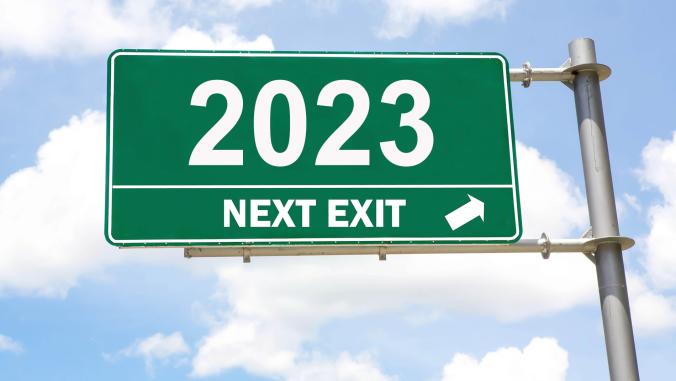Companies Aim for 'Zero'
<p>The notion of factories without Dumpsters isn't new, but in recent years a number of companies across industries have put "zero waste" squarely in their sights.</p>

[Editor's Note: This is part of a series of articles excerpted from our annual State of Green Business Report. The report takes a close look at the data behind the green business movement to track whether we're moving the needle on corporate sustainability. Download the free report here.]
The notion of factories without Dumpsters isn't new. Xerox, for one, began an internal initiative in the early 1990s known as the Waste-Free Factory. It hasn't yet achieved that goal, but it has driven the company to reach a 92 percent recycling rate for non-hazardous materials.
Along the way, other companies have put "zero waste" squarely in their sights. And a growing number have hit the mark. Some, like General Motors, which announced that more than half of its 146 global manufacturing plants had achieved zero waste, have been at this for more than a decade. Others are just getting started. Procter & Gamble, for example, announced its first zero-waste manufacturing plant in North America, part of a companywide zero-waste goal. Still others reached admirable milestones. Sunny Delight said its Sherman, Texas, plant became the company's final site to get to zero waste, while Kraft announced that nine facilities had achieved that distinction.
 As Kraft came to learn, with a little ingenuity almost anything can be kept from landfills. An Allentown, Pa., plant sends off 5 million pounds of mustard seed hulls left over from making Grey Poupon for use as animal feed, instead of to the trash. Kraft's Lowville and Campbell plants in New York dump whey, left over from making Philadelphia cream cheese, into digesters to make biogas to generate heat, supplying about 30 percent of the plants' energy needs. A Tang factory in China realized that instead of sending sugar that didn't fit its recipe back to a supplier, it could forward it to another Kraft plant in China that makes Halls cough drops. Sweet!
As Kraft came to learn, with a little ingenuity almost anything can be kept from landfills. An Allentown, Pa., plant sends off 5 million pounds of mustard seed hulls left over from making Grey Poupon for use as animal feed, instead of to the trash. Kraft's Lowville and Campbell plants in New York dump whey, left over from making Philadelphia cream cheese, into digesters to make biogas to generate heat, supplying about 30 percent of the plants' energy needs. A Tang factory in China realized that instead of sending sugar that didn't fit its recipe back to a supplier, it could forward it to another Kraft plant in China that makes Halls cough drops. Sweet!
These companies join others that have reached zero-waste goals, from Caterpillar to Coca-Cola, Diageo to Disney, brewers (MillerCoors) to ball clubs (the San Francisco Giants).
A far greater number of companies are on their way to "zero." Carpet manufacturer Interface, which set a Mission Zero goal more than 15 years ago, said that of the 400 million pounds of raw material it purchased in 2009, only 3.4 million pounds went to landfill -- less than 1 percent.
As these companies have learned, cutting waste can yield multiple savings. Dell, for example, which last year edged close to its goal to cut 20 million pounds of packaging, found that optimizing packaging had several benefits. For example, it examined packaging for its Inspiron laptop and determined that by reducing what goes inside the box and laying out items in the box differently, it could shave off a few millimeters -- enough to fit nine additional boxes on a pallet, reducing transportation and storage costs. You don't need a laptop to compute those savings.
It's not all easy going. One issue is that there is no generally accepted definition of what "zero waste" means. For example, some companies define zero waste to include incineration and other thermally driven technologies that many nonprofits, public agencies, and waste management professionals don't consider to be worthy of inclusion. On the other hand, the Zero Waste International Alliance states that "Businesses and communities that achieve over 90 percent diversion of waste from landfills and incinerators are considered to be successful in achieving Zero Waste, or darn close."
"Darn close" isn't likely to cut it in the hypersensitive world of green, so this is an area sure to attract accusations of "greenwashing." That may be a good thing: It suggests companies are engaged and striving to make zero-waste claims. Competition and oversight will sort things out.
Whatever the definition, there are more "zero heroes" to come. Several big companies, among them P&G, Sony, and Walmart, have set ambitious zero-waste goals, even if their timetables are a decade or more away. That doesn't mean they aren't starting now -- indeed, they must, in order to get from here to "zero." All told, it's a bandwagon that's just getting rolling.
Photo CC-licensed by urbanartcore.eu.





